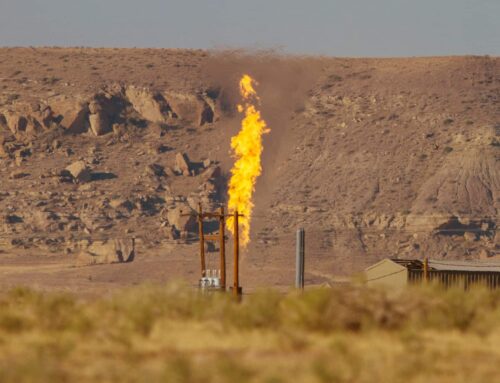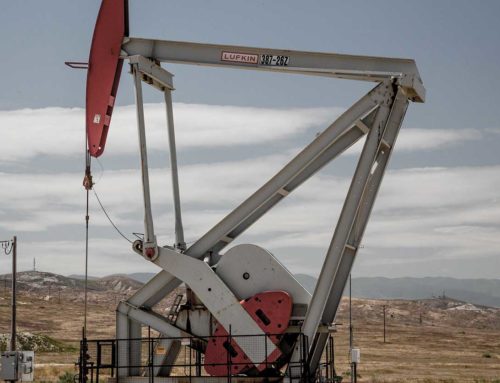Oil drilling in Nevada is a risky bet—the geology is complicated and drillers say the odds are small that they will actually find oil in a state where there are only 120 producing wells.
But since President Donald Trump took office pledging to expand oil and gas leasing on federal lands, Nevada has become the Wild West for oil speculation.
The administration has put more than 1.8 million acres of federal lands in Nevada on the auction block for leasing since March 2017, more than double the 818,000 acres leased in Nevada during the last four years of the Obama administration.
Many of the leases are in regions that have little proven oil production potential, according to environmental group protests filed against the lease sales.
The environmental groups oppose oil and gas development in the state. Giving companies leases on large areas of land that aren’t likely to produce oil and gas, the groups say, opens them to environmental damage with little if any return.
Oil companies say exploration of such land is risky, but the potential rewards can make that attractive.
Most recently, the Bureau of Land Management included 200 parcels across 389,000 acres of public lands in a July 30 oil and gas lease sale in Nevada. Only 8 percent of the leases sold, according to the results. Most of the leases went for $2 to $3 an acre, although some were for as high as $47 per acre.
But beginning the day after the sale, companies can buy up the remaining leases at a discount without having to bid competitively. Leases expire 10 years after they are purchased.
Finding ‘What Might Be Left’
“The oil and gas industry in the U.S. is 150 years old. We’re going to places that haven’t seen development to see what might be left,” said Patrick Gibson, vice president of Michigan-based West Bay Exploration Co., a small oil developer that purchased nine western Nevada parcels on July 30.
“It’s economically risky,” Gibson said. “The likelihood of finding something is fairly small compared to other areas of the country.”
Nevada has never been a big oil producer, and only five oil and gas companies operatethere. Production in Nevada has declined since 1990, and today the state ranks 26th nationally for oil production and 33rd for natural gas production, according to Energy Information Administration data.
There is little evidence that oil production will boom anytime soon despite expanded oil and gas leasing there, Rich Perry, administrator of the Nevada Division of Minerals, said.
“I think there’s been a lot of speculation,” Perry said. “I’m not hearing from any major oil companies or entities that they have any interest in Nevada.”
Millions of Acres, Few Oil Wells
Yet, oil speculation is nothing new in Nevada. Oil and gas leasing on federal land was widespread during the George W. Bush administration and slowed significantly during the Obama administration, resulting in only a handful of wells drilled.
The BLM leased 8.25 million acres of federal land in Nevada from 2004 through 2016. Only 44 wells were drilled there during that period, BLM data show.
Those numbers show that Nevada is an aberration compared to other Western states because dramatically more land is being leased in Nevada than there is demand to drill, said Kathleen Sgamma, president of the Western Energy Alliance, a trade group representing small oil companies in the West.
Anyone can anonymously nominate parcels of public land to be included in a BLM oil and gas lease sale, regardless of whether there is oil and gas production potential or industry interest in developing there. There are no fees associated with nominating land for oil leasing.
“There are a few bad actors who keep nominating way more acreage than there’s industry interest in,” Sgamma said.
In other Western states, the number of acres leased for oil and gas matches the industry’s demand, she said.
“There are indeed a handful of legitimate operators who are doing some development in Nevada, and that’s why some parcels sold [July 30]. But the disconnect of too much acreage nominated than is leased is unique to Nevada, and not seen in the major Rockies producing states,” Sgamma said.
Drawing Rebukes
The results of the July 30 lease sale drew rebukes from both sides of the political spectrum.
Taxpayers for Common Sense issued a statement July 31 saying the BLM’s leasing process is broken because companies can buy up unsold leases at a discount after the lease sale without having to go through a competitive bidding process.
Phil Hanceford, conservation director for the Wilderness Society, said the results of the July 30 lease sale show that the BLM continues to support “rampant speculation.”
The BLM didn’t respond to requests for comment.
Nevada a Tough Oil Prospect
Finding oil in Nevada is extremely difficult because of the state’s complicated and “tough” geology, said Richard Taylor, owner of Las Vegas-based Western General, one of the five oil companies operating in Nevada.
Oil and gas leasing in the state is occurring outside of areas that have known oil deposits, but if a company can find oil there, “it’s going to pay off very handsomely,” he said.
But Nevada’s changing politics are keeping out bigger companies that want to use hydraulic fracturing on large acres of land, he said.
The state enacted regulations on fracking in 2014, and in 2017 lawmakers proposed a fracking ban that was approved in the Nevada Assembly but failed in the Senate.
Fracking has effectively “been put off the table” because of the political shift, but that provides an opportunity for small oil companies that want to explore for oil using conventional drilling methods, Taylor said.










